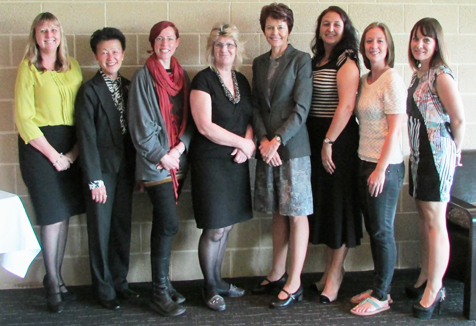Team Profile: MyVoice Career Development for Academics Working Group

From left to right: Deborah Sweeney (Chair), Aggie Lim, Tamara Watson, Leone Cripps, Deidre Russell-Bowie, Kim Nemetz, Chloe Taylor, Kelly Lanfranca.
A number of working groups were established to respond to MyVoice staff engagement survey feedback and make improvements in the areas important to staff.
This month, we profile the Career Development for Academics Working Group.
Who is in the team?
Chair: Associate Pro Vice-Chancellor (Research) Health and Science, Deborah Sweeney
Mentor: Simeon Simoff, Dean of School of Computing, Engineering and Mathematics
Mentor: Peter Hutchings, Dean of School of Humanities and Communication Arts
Aggie Lim, Director, Office of Organisational Development
Chloe Taylor, Lecturer – Exercise Science, School of Science and Health
Deidre Russel-Bowie, Associate Professor, Primary Education, School of Education
Fiona Pacey, School Manager, School of Medicine
James Arvanitakis, Professor and Academic Course Advisor, School of Humanities and Communication Arts; Head of The Academy
Kelly Lanfranca, Project Officer, Office of Organisational Development
Kim Nemetz, HR Programs Officer, HR Support Services
Leone Cripps, Senior Consultant, Office of Organisational Development
Michelle Bissett, Lecturer and Academic Course Advisor, Occupational Therapy, School of Science and Health
Tamara Watson, Research Lecturer – Social, Personal & Developmental Psychology
What does the Career Development for Academic Working Group do?The main aim of the Career Development for Academic Staff Working Group is to provide career development opportunities, events and tools for academic staff. Our main areas of focus are mentoring, promotions and academic portfolios of achievement.
What's a good example of the work you are involved in?The Career Development for Academic Working Groups has introduced the appointment of mentors for academic promotion, giving staff who are applying for promotion the opportunity to receive one-on-one advice from those who have already been through the process. The Promotion Information Sessions have also been expanded to include talks and advice from successful promotion candidates. Mentor details can be found on the Academic Promotion Mentors webpage (opens in a new window).
The group has launched the Career Development for Academic Staff online module, so academic staff members can learn about a methodology for developing and furthering their career within an academic environment. And, if you're preparing for promotion, there are some useful PowerPoint slides, which can be found on the Academic Promotion webpage (opens in a new window).
The Working Group has hosted speed-mentoring sessions with early career researchers on the Campbelltown and Kingswood campuses. These sessions provide a chance to meet with members of the Professoriate in 10-minute intervals to discuss teaching, research, governance, engagement and writing. If you're an early career researcher, register your interest at myvoice@uws.edu.au to ensure you don't miss out on future sessions.
One of the mentors, Vaughan Macefield, Provost of Campbelltown campus and Professor of Integrative Physiology in the School of Medicine, said the following about the program:
"The speed mentoring program is excellent, and I felt the inaugural meeting ran very well; I certainly wish I had this opportunity when I was looking for guidance on my career trajectory. While the time with each mentee is necessarily short, as a mentor I did feel I could latch on to some common themes regarding how to build one's research profile. For me, the most critical piece of advice can be summed up in one word: collaborate. It is through collaboration that we expand on our capacity, not just through teamwork but also by the concrete advantages of having someone with a rich track record as a co-investigator on a grant application, for example. Most successful people, whether they are scientists or musicians, business people or artists, have benefitted from collaborating. I would very much like to see this Speed Mentoring event continue, and to expand."
What are some of the challenges?Our main challenge now is to spread the word about the work that we have done and to allow as many members of staff to benefit from these new career development opportunities as possible. In the long term we hope to ensure that all staff can benefit from having a mentor regardless of their stage of career, that staff are supported in developing their careers and documenting their achievements, and that the promotions applications process can be improved for the benefit of both the applicants and the committees. We will be promoting the initiatives at the workshops run by the Office of Organisational Development, and at as many of the up-and-coming meetings and forums as possible. All academic staff should now have received a copy of the Checklists to capture evidence of Academic Achievement in the internal mail. We have also provided all the information on an updated career development webpage. This site also includes information about other opportunities that are available, such as scholarships and workshops. We hope that anyone who has a positive experience from a MyVoice initiative can share this with colleagues to encourage others to make the most of the opportunities on offer.
What is the team focusing on in the next 12 months?The Career Development for Academics Working Group has researched the current UWS promotions application process and, thanks to feedback from the promotions committee and recent applicants, will be working on developing a hands-on promotions workshop to assist staff with their applications. We plan to build on these initiatives by continuing to improve the promotions applications process and setting up campus-based early career networks.
Mobile options:

